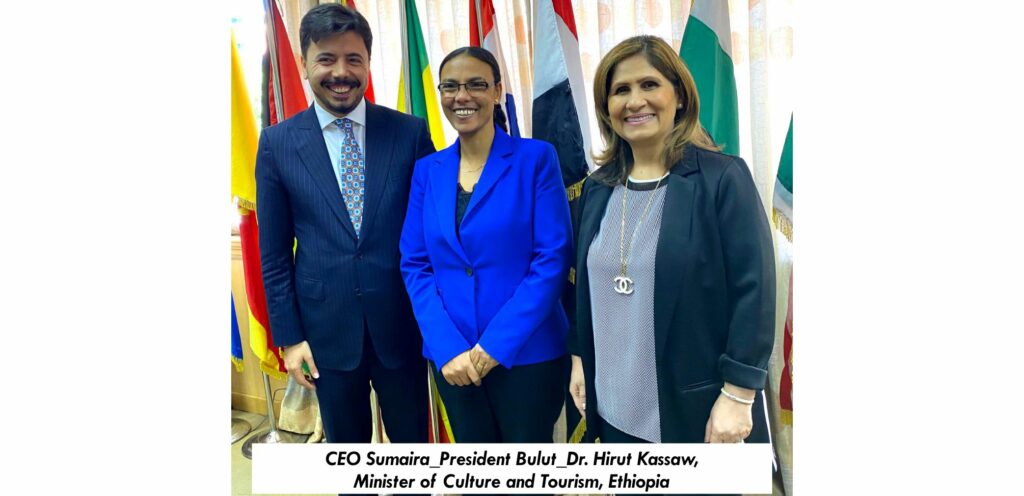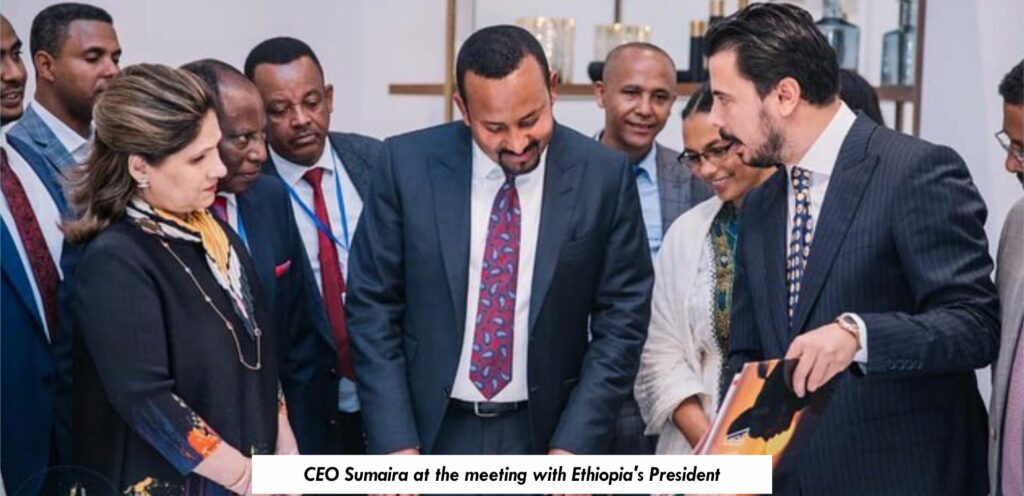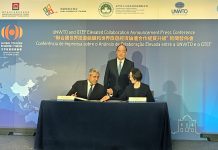MS. You had started interning when you were just 16 years old, in a Travel Agency. While Dubai is known today more for its fast cars and life of luxury, it was not that long ago. Please share with us your professional journey, major hurdles overcome and milestones achieved so far.
Sumaira Isaacs. I started interning in Travel agency in Dubai at the age of 16, when there were only two hotels in Dubai Jebel Ali and Chicago beach (the Present Burj Al Arab location). In those days there were no tourists coming to Dubai, only friends and relatives (VFR) and the highest building was the clock tower. Milestones are many and hurdles were 3 times more, but hard to summarise. As biggest milestone is always your last one or one where you currently are. But if you ask me ONE, which is my greatest honor: Then its perhaps writing Pakistan’s national tourism strategy for next 10 years and 5 years action plan to support it.
“ We believe strong travel and tourism agenda for a government’s economic policies can be a catalyst for change, and those are the countries we want to support and educate..”
MS. Currently, serving as CEO of World Tourism Forum Institute, London, UK, what are your roles in ‘Reshaping Economies Through Tourism’.
Sumaira Isaacs. Yes we believe we go and serve countries where no one’s ever been, taking the developed world with us. We believe a strong travel and tourism agenda for a government’s economic policies can be a catalyst for change, and those are the countries we want to support and educate.
MS. Tourism is considered as one of the major sources of economic activity for any country. How Pakistan offers diverse opportunities for tourists?
Sumaira Isaacs. Pakistan’s tourism potential is the BEST kept secret of our industry and perhaps one of the last frontiers to open to the world, of this scale and magnificence – at least in recent times. But, tourism is not new for Pakistan. They have one of the largest domestic segments. After the pandemic, the world started to focus on domestic travel, but this already existed in Pakistan long before. They are now in the process to launch their international product. Under the PM Imran Khan’s vision and passion for tourism they are just unfolding their story on the world stage, and I am honoured to have played my role.

MS. What are the challenges and threats surrounding the Tourism Industry in Pakistan?
Sumaira Isaacs. No threats only opportunities, but like any country in the region, safety and security is always foremost critical focus and priority for consistent tourism flow of investments and tourists.
MS. What are the roles and responsibilities of the government and the private sector for the development of sustainable tourism?
Sumaira Isaacs. A government’s role is to ensure a positive and safe climate for both the tourist as well as for the business and investments of tourism. Without a political will on the TOP most level, a country cannot pursue a safe and sustainable tourism agenda. The government and private sector must be aligned and have strong fundamentals of local bodies and associations supporting and representing all stakeholders, aligned towards a “SINGLE” strategy to invite ‘meaningful tourism’. In order to invite meaningful tourism, you require meaningful investments, and they can only come if the governments follow a FIVESTAR agenda of building blocks 1) Safety & Security 2) Infrastructure 3) IT communications network 4) Healthcare 5) Education/vocational training.
The necessity to rethink tourism is based on the insight that tourism today goes beyond recreation. Among the about 20% of mankind affluent enough to afford international tourism and about the two thirds of mankind affluent enough to afford domestic tourism, few people travel to rest their limbs and muscles anymore. A great variety of other activities, from business and MICE travel to visiting friends and relatives, religious travel, educational travel, special interest travel to second homes and digital nomads combining online work and travel, make up the whole universe of unforced mobility.
The wish to refresh the brain and the wish for self-actualisation by new experiences and new inspirations as well as to gain social capital, bragging power, was given increased importance already before the Covid-19 pandemic. However, the sudden experience of the fragility of life and the possibility of a shattering of the perceived stability of personal circumstances almost regardless of personal wealth has led to a new criticism of shallow consumerism and 3B (Beach, Beer, Boredom), 3S (Sea, Sun, Sex, or in the Chinese variation Sightseeing, Shopping, Selfies) tourism. “Meaningful Tourism” can be one of the ways to reimagine tourism. It is a concept developed by the Founding Dean of our HATT Business School Institute, Prof. Dr. Wolfgang Georg Arlt.
“Meaningful Tourism” refers to a new concept for the post-pandemic development of global tourism. It is a new paradigm aiming at advancing the existing concepts of sustainable and responsible tourism. It changes the predominantly supply-side and often negative perspective of Sustainable Tourism and Responsible Tourism towards a demand-side and more balanced perspective, promoting tourism which is meaningful for all stakeholders involved:
- For tourists to get new experiences and to increase their knowledge about themselves and about others
- For host communities to have more influence on tourism development and to benefit instead of suffering from visitors
- For the staff of tourism and hospitality service providers to offer full-time career jobs, good quality service, and meaningful activities
- For governments to gain employment opportunities for their citizens, increased tax income and support of friendly international relations
- For the environment, an encouragement for all stakeholder to be careful and more interested causing no or at least less damage locally and to push for non-polluting forms of mobility globally.
Global environmental concerns culminated in the Brundtland report “Our Common Future” which successfully introduced the notion of sustainability. However, the intellectually appealing concept of sustainable tourism found limited practical application because it could be turned into a public relations tool for addressing the criticism of the impact of tourism while allowing essentially the same behaviour as before, or into what is today called “greenwashing”. Meanwhile tourists became more ecologically aware; demanding more environmental resource–based experiences and showing increased sensitive to the actual environmental quality of destinations.

MS. Would you come as a tourist to India, and if so, why?
Sumaira Isaacs. India is a real case study of travel and tourism destinations and a great brand.
I have been to India several times, and it was my honor started one of the first International Professional Congress Organiser PCO’s in the country MCI Group – hence directly contributing to local economy and creating jobs in Delhi, Mumbai, Bangalore, and Hyderabad. Yes, I would come to India anytime as a tourist or otherwise.
MS. Could you tell us about your recently organised events for MICE industry? How was the Summit proved to be a vital meeting place for the Travel & Tourism industry?
Sumaira Isaacs. All of our events are a testimony to the destination we place them in – where all stakeholders come together to talk about the issues at hand. Our recent hybrid events of Indonesia and Brussels are a example where although live component due to covid restrictions was small – but the online viewership exceeded a million plus. That means there is a real need for the industry to come together, and people in far flung parts of the world are looking for a North Star and we are trying to fill that gap.
MS. Please throw some light on your Palestine case study. This country has been voted in the top 5 destinations trends for 2020.
Sumaira Isaacs. With Israel and the Palestinian territories constantly littering the media with turmoil and conflict, there is one remaining aspect of stability: the region’s wealth of beauty is undisturbed by the tension and well worth a visit for historians and admirers of the aesthetic alike. Tourism can be that anchor and sedge way the country needs to get out of conflict, and eradicate the poverty, and refocus its youth towards something that can help provide immediate livelihoods.
MS. What are your thoughts on religious tourism?
Sumaira Isaacs. Religious tourism is an amazing product line, and if any country is blessed with it they must harness its power and exploit it to the fullest but in a sustainable way. Both India and Pakistan or for that matter Palestine are blessed in this. The segment already exists – all the governments need to do is apply the FIVESTAR building blocks I just mentioned above. The product is already there!!
MS. What has been your biggest challenge in navigating today’s uncertainty? How are you keeping yourself motivated and positive?
Sumaira Isaacs. Again it’s been really just opportunities. I had huge opportunity to reinvent our organisation form a conference based to a travel tourism think tank. Our online adaptation was quick and fast – and not because everyone was talking about digitization, but for us it was matter of survival do or die! And we are one of the lucky ones who got the model right!
MS. On a personal note, we are curious to know what keeps you busy when you are away from work?
Sumaira Isaacs. Of course my painting.. follow my Instagram nadle Sumaira.isaacs
I have to paint everyday – even if its for a few minutes.














